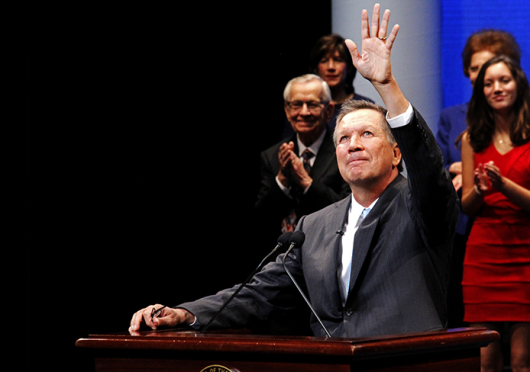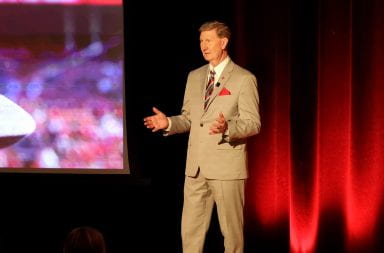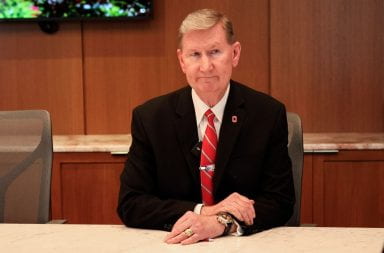
Republican Gov. John Kasich delivered his inauguration speech to a packed Southern Theatre in downtown Columbus Jan. 12. Credit: Jon McAllister / Asst. photo editor
“You have to celebrate your wins, you have to celebrate your victories, but we’re nowhere near done yet, not by a mile … In some ways the stakes are higher now.”
Republican Gov. John Kasich delivered his inauguration speech on Monday to a packed Southern Theatre in downtown Columbus, with faces such as Republican Sen. Rob Portman, Columbus Democratic Mayor Michael Coleman and former Ohio State President Gordon Gee in the crowd.
New Jersey Republican Gov. Chris Christie was also supposed to be in the audience, but was held up by the weather.
Before the inauguration kicked off, the ornate theatre was in a frenzy: someone wiped down the podium, enthusiastic volunteers were at every turn, and the occasional man in a dark suit spoke into his wrist.
Although Kasich had been officially sworn in for his second term just after midnight Monday, he held a ceremonial inauguration after noon where his 45-minute speech stressed not only how proud he is of how far the state has come, but also that he doesn’t want “to get comfortable.”
“If we’re not innovating and growing and changing, we’re dying and there’s nothing in between,” Kasich said, referring both to public policy and economic development.
Zachary Pohl, a fourth-year in logistics management and president of the Ohio State chapter of College Republicans, said he is a fan of Kasich.
“I like how he gives a speech, without really giving a speech. It’s very informal, it’s kind of refreshing,” Pohl said. “As far as policies, or things that he’s done, I really like getting rid of the estate tax, and cutting taxes overall. And in some parts of the government, making it a little leaner.”
Kasich touted his tough-on-budgets stance, something he demonstrated while he chaired the House Budget Committee as a congressional representative from the 15th district, balancing the federal budget from 1998-2001.
“We’ve worked on making government run more efficiently and more effectively and more like a business. And let me tell you, when you do that, you can produce better results and more for people with less government, and even less spending,” he said.
But Keary McCarthy, president of Innovation Ohio, a left-leaning policy think tank based in Columbus, said he had concerns about how much of the state’s budget is being cut.
“There is a very concerning lack of funding for public education in Ohio,” McCarthy said, also noting that when small budgets hit small communities, “it affects very real things: public safety, trash collection, local infrastructure.”
In his speech, Kasich went on to emphasize bipartisanship in politics.
“Consider for a moment, that somebody else may be right, that there might be a better way,” Kasich said, “Let me be clear, just because someone has a different opinion, it doesn’t make them an enemy,”
Kasich also emphasized teamwork, citing OSU’s former football coach Woody Hayes as an inspiration.
Despite disagreements on issues such as Ohio’s regulation on abortion, and citing concerns such as Ohio’s spot at 45th in the nation in terms of job creation, James Alford, a fourth-year in international studies and psychology and president of Ohio State’s College Democrats, was able to find agreement with the governor on some issues.
“In his new term, I’d like to continue to see him reach across the aisle,” Alford said. “We, as College Democrats, are extremely happy with redistricting reform and the expansion of Medicaid. Policies that aren’t partisan in nature and serve all Ohioans are what we strive to promote and to work to achieve with our membership.”
The move to expand Medicaid has split many Republican governors, but Kasich and Christie both expanded it in their respective states. Both governors are also seen as potential presidential candidates for the election in 2016, although neither has made a formal declaration.
While Kasich stressed personal responsibility for one’s life, and hard work above government dependency, he also called on the audience to understand the plight of the impoverished, saying, “Do not be bitter at people that need temporary help.”
“Economic growth is great, but there’s one thing that people in my political party don’t always understand. Economic growth is not an end unto itself. Economic growth provides the means whereby we can reach out and help those who live in the shadows,” he said.
Michael Hartley, vice president of government relations at the Columbus Chamber of Commerce, was optimistic about Kasich’s role in Ohio’s economic development in his first term, and said he is looking forward to working with the governor again.
“Some of this is maybe on the federal level, but regulations and opening up opportunity (are what we’re looking for). This could be a JobsOhio thing. Allowing and being open to getting over there to these countries, much like we do, and Columbus 2020 does,” Hartley said. “They go out and they visit, they’re going to be in China coming up, all over the world, and you try to bring those in. And JobsOhio can continue to assist in that effort.”
JobsOhio is a private nonprofit created by Kasich and the state legislature in 2011 that works to expand Ohio’s economic and business development efforts in a privatized setting.
Columbus 2020 is the regional partner to JobsOhio, focusing on economic and business development specifically in the Columbus region, with a goal of generating 150,000 new jobs, $8 billion of capital investment and increasing personal per capita income by 30 percent in the Columbus region by the year 2020.
“A lot of this is continuing to take the next steps that the governor has already done in his first term,” Hartley said.
Kasich will have until the end of 2018, barring a presidential run and victory, to make good on his promises for Ohio.
The governor currently has the support of a Republican-controlled Ohio General Assembly, in both the House and the Senate.
“I hope I can show Ohioans how much good can be achieved, when we laugh at the impossible, and just go for it,” Kasich said.


